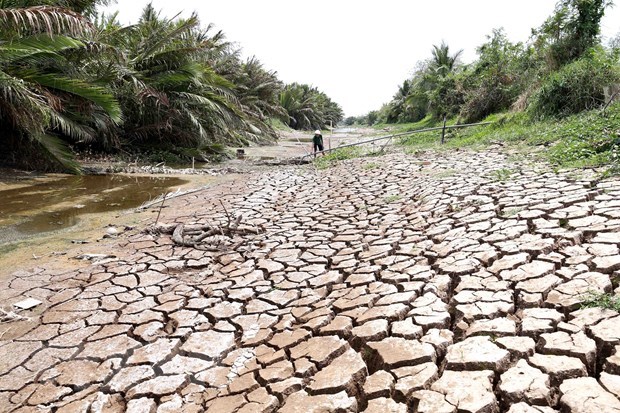 |
|
Drought in Mekong Delta province of Tien Giang
|
They noted that more extreme weather phenomena and frequent natural disasters in Southeast Asia have caused substantial ecological, human, and economic damage.
The Mekong River is an example of challenges in national and regional stability associated with climate change, they added.
The Mekong River flows through six countries and benefits more than 65 million people. Reduced rainfall between May and October last year triggered a prolonged drought that, experts believe, may lead to significant crop losses this year. A previous long-lasting drought affected hundreds of thousands of hectares and caused crop losses totalling more than 380 million USD.
The effects of drought are exacerbated by the Mekong River’s water level, which has been falling for many years. In 2019 and 2020 the water level, especially in the Mekong Delta, fell to its lowest point for 100 years.
Lower water flows into the Delta, along with a rise in sea levels, has led to the increasing salinity of arable land. The area available for agricultural production is now shrinking as a result, the German experts found.
Falling water levels, they added, are not only the result of climate change but also the impact of population growth and economic development in the Mekong region as well as the construction of a large number of dams in the river’s upper reaches.
They emphasised that transnational water management must take into account economic development as well as the social and ecological effects./.VNA

Scientists grow quinoa in drought-stricken areas in Vietnam
Drought-stricken and saline soils can be areas for growing quinoa, a grain for healthy diets, thanks to a research cooperation program between the Vietnam Agriculture Academy (VAA) and Buenos Aires Argentina University.
 Recent research from experts at the German Foundation for Science and Politics (Stiftung Wissenschaft und Politik - SWP) highlighted shortcomings in managing the Mekong River’s water resources." itemprop="description" />
Recent research from experts at the German Foundation for Science and Politics (Stiftung Wissenschaft und Politik - SWP) highlighted shortcomings in managing the Mekong River’s water resources." itemprop="description" />